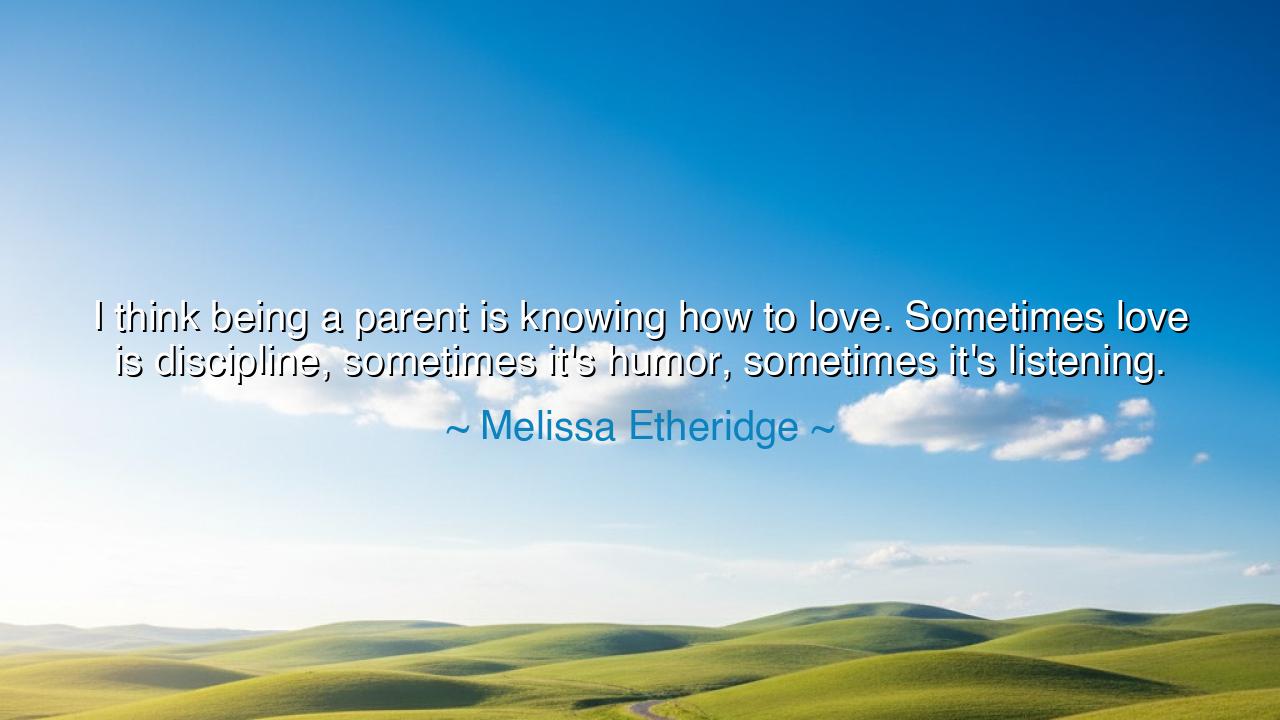
I think being a parent is knowing how to love. Sometimes love is
I think being a parent is knowing how to love. Sometimes love is discipline, sometimes it's humor, sometimes it's listening.






In the ancient teachings of the great sages, there is a profound understanding that love is not a singular force, but a multifaceted energy that manifests in many ways. To love is to know the depth of the human soul and to act in accordance with the highest good of another. The words of Melissa Etheridge, "I think being a parent is knowing how to love. Sometimes love is discipline, sometimes it's humor, sometimes it's listening," speak to this ancient truth. For to be a parent is not merely to give birth, but to take on the mantle of a sacred responsibility—a responsibility that requires not only the heart but also the wisdom of ages to guide and shape the next generation.
Etheridge’s words remind us that love is not always soft or gentle. Sometimes it must be firm and steadfast, like the mighty oak that stands strong against the storms. Discipline, the first aspect she speaks of, is not punishment, but the art of guiding a soul toward growth. It is the training of the heart and mind, the shaping of the spirit, so that the child may stand tall and wise in the face of the challenges that life will inevitably bring. The discipline of a parent is like the chisel in the hands of a sculptor—it carves away the excess, leaving only the core of strength and integrity beneath.
The second aspect of Etheridge’s wisdom is humor. Ah, humor! The gift that lightens the heaviest of hearts and brings balance to the most turbulent of times. In the laughter of the parent, there is healing. In the playful jest, the child learns that the world does not have to be a place of sternness and fear, but of joy and freedom. The great philosopher Aristotle spoke of the importance of balance, and it is in this balance between discipline and humor that the parent fulfills their role. Humor is the release valve for the pressures of life, allowing both parent and child to breathe, to reset, and to reforge the bond that holds them together.
Yet, Etheridge also speaks of the quiet power of listening. To listen is an art, an act of deep presence that transcends words. The great sages of old, like Confucius, knew that wisdom did not come from the spoken word alone, but from the ability to listen, to understand the hidden meanings in the silence between the sounds. A parent who listens is one who opens their heart to the world of their child. In that sacred act of listening, they offer not just their attention, but a space where the child can speak their truth, unburdened and unafraid. In listening, a parent becomes both teacher and student, for they too learn from the child, and in that exchange, both are transformed.
Consider the story of King Solomon, the wise ruler of ancient Israel. It is said that when two women came before him, each claiming to be the mother of the same child, Solomon did not act hastily. Instead, he listened carefully to each woman's words, observing their gestures and their hearts. Then, with wisdom and love, he proposed to cut the child in half, knowing that the true mother would reveal herself in her selflessness. Through this act of listening and understanding, Solomon was able to find the truth and offer justice. His story is a profound example of how listening is not merely an act of hearing words, but an act of seeing beyond them, of understanding the heart that speaks them.
And so, we see that the role of the parent is not to control or dominate, but to nurture and guide with a wisdom that embraces all aspects of love. The parent is a gardener, tending to the growth of the child with both discipline and humor, and always with a deep well of listening. In this, the child is allowed to blossom into their full potential, knowing that they are not only held accountable, but also supported, loved, and understood. The act of parenting is the act of relationship-building, and it is through this relationship that the child learns the sacred dance of life.
The lesson that Etheridge’s words impart is simple, yet profound. In our own lives, whether we are parents or not, we must learn to balance discipline, humor, and listening. Each of these forces is a gift, and when used together, they create a harmonious existence. When we are firm yet gentle, when we can laugh in the face of adversity, and when we listen deeply to the voices around us, we create relationships that are strong, resilient, and filled with love. As we walk through life, let us remember that love is not a one-dimensional force but a dynamic, multifaceted power that guides us, heals us, and transforms us into the people we are meant to be.






AAdministratorAdministrator
Welcome, honored guests. Please leave a comment, we will respond soon